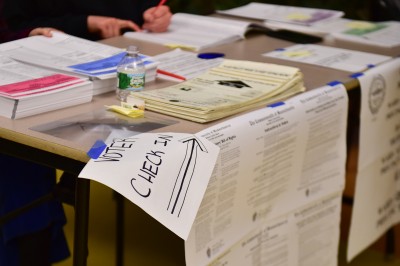
Less than 9 percent of Boston residents voted in the Massachusetts primary elections this past Thursday, the Secretary of the Commonwealth’s office said.
The primaries allowed Massachusetts residents to vote for local party nominees for the state legislature, Congress and certain other county offices. Brian McNiff, a spokesperson for Secretary Bill Galvin, said many nominees ran unopposed.
This lack of opposition was one contributing factor to the low turnout, according to McNiff.
“The turnout at a primary depends very much on whether or not there are contests,” McNiff said. “Some areas there were contests, but many offices were not contested.”
Virginia Sapiro, a political science professor at Boston University, wrote in an email the low voter turnout this past primary election is unusual, even for primaries.
“Most people probably did not know there were primaries going on, and they didn’t affect offices that were high enough for most people to notice,” Sapiro wrote.
McNiff said the low turnout could be attributed to the atypical date of the election. While primaries are usually held on a Tuesday, this year’s Massachusetts primary election took place on Thursday.
“The ballots for the general election, by federal law, have to be sent out to overseas voters 45 days before the election, so Tuesday, Sept. 20 was just too close to that deadline to be able to complete an election and any possibly recounts,” McNiff said.
The legislature chose Thursday as opposed to Wednesday to allow for a longer delay between Labor Day and the election, according to McNiff.
“People are coming back from Labor Day [vacations], some schools are just starting that day and preparing polling places would require people working on the holiday, which would increase the cost for the citizens,” McNiff said.
In light of the low turnout, McNiff encouraged voters to participate in the voting, since September primaries determine November elections.
“Where there are contests it is important to vote because if you look at the lineup of the districts, the person elected at the primary is unopposed in the general election,” McNiff said. “If there is a choice, that choice is made in September, not November.”
Philip D’Agati, a political science professor at Northeastern University, also emphasized the importance of voting in primary elections.
“Winners of primaries go on to the general election,” D’Agati said. “Voters need to pay attention to the primary because one of the winners of the primary will most likely be the winner in November.”
Several Boston residents said they were unaware that the primaries were held Thursday. Some said they knew but chose not to vote.
Susan Alves, 58, of Jamaica Plain, for example, said she knew about the election but was unable to vote because of her busy schedule.
“They need to change the way we vote so that you can have a busy life and still vote,” Alves said. “There’s no parking where my polls are, so I have to make a plan and it’s a pain in the neck.”
Tyler Allen, 34, of Brighton, said he did not know about the Massachusetts primaries, but would have voted had he been aware of the date.
“It’s important to vote in the local election just because there’s power in numbers and it’s important for people to know what’s going on,” Allen said. “If I knew about it more I definitely would have gone and voted.”
Erik Brown, 32, of Brighton, said this past election was more important than the upcoming election in November.
“Most of the politics that people are affected by on an everyday basis are the local politics,” Brown said. “Local politics impacts people more tangibly and more acutely than at the national level.”






















































































































